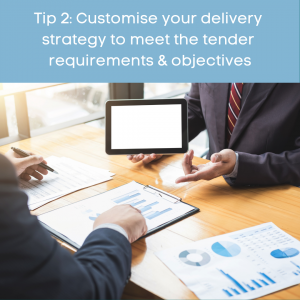By Kate Burrows, Managing Director, Tender Training College
Mediocrity and tender writing are two concepts that don’t fit well together. If you are serious about winning the bid, your response needs to go above and beyond the business as usual.
I have had several clients share with me recently about how they have accidentally fallen into the generic zone with their tender writing.
They are writing to answer the question – often copying and pasting from previous submissions – but with little application to the contract they are bidding to win and the client they are hoping to impress.
The result is a generic response that isn’t likely to differentiate them from the competition and score them top marks.
However, I can understand how it happens – when you are juggling multiple priorities and focused on getting the job done, or struggling to get the information from colleagues to write a differentiated response.
So, how do you avoid or escape the generic zone when it comes to writing a tender response?
Here’s a few tips to take your response from mediocre, to meaningful and relevant.

Tip 1: Understand and address the tender requirements in your response
The questions in the tender document are designed so that you can show the client that you can deliver upon the requirements of the contract if you are the successful proponent.
It is tempting to copy and paste from previous submissions – particularly when the tender might be for the same client, or the question is similar to one you have answered before.
But that also increases the risk of missing the specific requirements and nuances of that tender.
Every tender is different, so you must take the time to read, understand and address the requirements you will need to deliver upon when you are writing your proposal.
Otherwise, your response could be for any tender or for any client.

Tip 2: Customise your delivery strategy to meet the tender requirements and objectives
Most companies have a standard approach for how they do business.
But you need to consider how you will customise this approach to:
- Meet the specific tender requirements
- Achieve the outcomes the client has set, i.e. the contractual performance measures and the procurement objectives.
To get into the top scoring zone – and out of the generic zone – you need tell the client how you will meet their specific requirements, and detail any unique features of this approach that will benefit them.
This is what differentiates you from the competition and makes you eligible to score top marks.

Tip 3: Clearly explain the benefits of your approach
Often when we are writing about a topic we are familiar with, such as the experience of a company, we might assume the evaluator already has knowledge about the business and its past performance.
This can result in providing insufficient information to thoroughly detail your experience and explain the benefits of what this experience means for the client.
The evaluators can only score what is written in your response. We need to go the extra mile and join the dots – telling them the benefits of our proposal, or in this case the benefits of our experience.
For example, if you are referring to your company’s 25-years’ experience in the construction industry, tell the evaluators what this means for them. That is: “Our experience means we understand the key risks of this contract, and we have managed these risks effectively for other clients. As such, we provide you with greater assurance we can meet the requirements for this contract.”
Join me for a Tender Writing Masterclass starting in June: more details on the website: https://tendertrainingcollege.com.au/upcoming-events/

